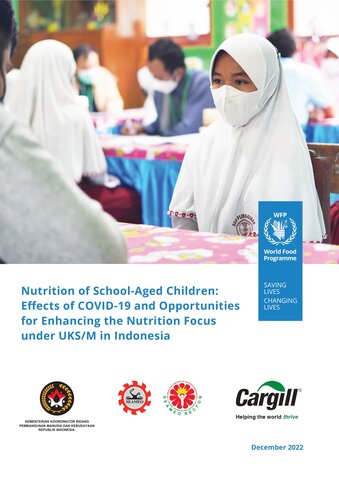
With support from Cargill, the World Food Programme (WFP) contracted the Southeast Asian Ministers of Education Organization Regional Centre for Food and Nutrition (SEAMEO RECFON) to conduct a study on the effects of COVID-19 on the nutrition of school-aged children and the opportunity for enhancing the nutrition focus under the school health programmes (Usaha Kesehatan Sekolah/Madrasah, or UKS/M) in Indonesia.
The study aims to: 1) assess the effects of school closures on food consumption patterns, knowledge and practices of school-aged children in Indonesia; 2) identify existing policies and programmes that ensure good dietary practices of school-aged children, as schools started to reopen for face-to face learning; 3) explore the relevance and effectiveness of existing nutrition education interventions for protecting and promoting healthy diets among primary school-aged children in the context of the COVID-19 pandemic; and 4) recommend strategic options and pathways of change that will be catalytic to improved, adaptive UKS/M nutrition education modalities within the context of COVID-19 and other disasters.
The study led to recommendations to strengthen the mainstreaming of nutrition education into the UKS/M programme.
WFP, 2022, Nutrition of School-Aged Children: Effects of COVID-19 and Opportunities for Enhancing the Nutrition Focus under UKS/M in Indonesia.
| Document | File |
|---|---|
| Indonesian version - Nutrition of School-Aged Children: Effects of COVID-19 and Opportunities for Enhancing the Nutrition Focus under UKS/M in Indonesia - December 2022 |
PDF | 9.79 MB
Download
|
| Indonesian version - Executive Summary |
Web page
View
|
| Indonesian version - Infographic |
Web page
View
|
